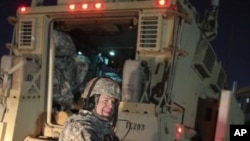The last convoy of U.S. soldiers has left Iraq, ending an almost nine-year long U.S.-led war that ousted Iraqi dictator Saddam Hussein and left Iraqis with a fragile democracy still facing insurgents and sectarian divisions.
The final convoy of 100 U.S. military vehicles carrying about 500 troops crossed into Kuwait Sunday morning at 7:38 a.m. local time, (0438 UTC), leaving behind only several hundred U.S. security personnel at the U.S. embassy in Baghdad. The withdrawal ended a war that cost the lives of almost 4,500 U.S. troops, tens of thousands of Iraqis, and hundreds of billions of dollars of U.S. government funds.
The last U.S. military convoy departed from a base in the southern Iraqi town of Nasiriyah under cover of darkness and secrecy to prevent any final attacks as it drove across a desert highway toward the border. The American soldiers cheered as they entered Kuwait and said they look forward to reuniting with their families.
The quiet withdrawal was a sharp contrast to the start of the war in March 2003, when U.S.-led forces launched airstrikes over Baghdad as part of what they called a "shock and awe" campaign against Saddam. U.S. and allied ground forces then stormed from Kuwait into Iraq, toppling the minority Sunni dictator of a Shi'ite majority nation within weeks and capturing him by the end of the year.
But, Saddam's fall sparked a Sunni insurgency that evolved into a brutal sectarian conflict between Iraq's Shi'ite and Sunni communities, with violence peaking in 2006. The scale of sectarian and insurgent attacks declined significantly after 2007, when the United States sent a surge of troops to Iraq and Sunni tribal militias sided with U.S. forces against Sunni al-Qaida militants.
At the height of the war, more than 170,000 U.S. troops were stationed in Iraq at more than 500 bases. The United States promised to withdraw them by the end of 2011 under a 2008 U.S.-Iraqi agreement signed by the administration of former U.S. President George W. Bush and implemented by his successor and current President Barack Obama.
Iraqis have expressed mixed feelings about the U.S. pullout. Many have celebrated the end of what they called an American occupation and a regaining of Iraq's sovereignty, while others have expressed gratitude for U.S. help in ousting Saddam and introducing democracy.
Many Iraqis also complain that their elected government has not done enough to rebuild the country's war-ravaged infrastructure. Another common concern is that the Iraqi government's delicate power-sharing arrangements may unravel in the absence of U.S. troops and reignite a sectarian conflict.
In a television interview recorded Thursday with U.S. network ABC News, President Obama said the U.S. troop presence in Iraq "succeeded" in giving Iraqis a chance to build a successful future. Obama opposed the war when he ran for office and vowed to end it. Opinion polls have showed a majority of Americans believe the war went on too long.
Photo Gallery: US Forces Leave Iraq
Some information for this report provided by AP, AFP and Reuters.
| Join the conversation on our social journalism site - Middle East Voices. Follow our Middle East reports on Twitter and discuss them on our Facebook page. |














